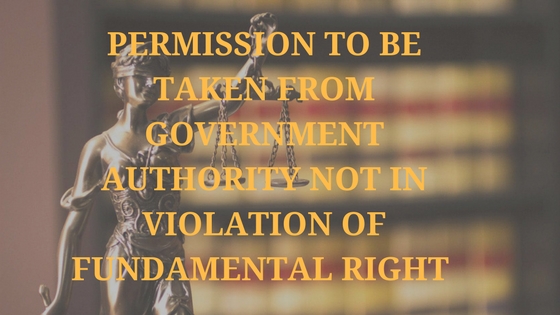Aapka Consultant Judgment Series- In this series, we are providing case analysis of Landmark Judgments of Hon’ble Supreme Court of India
Himat Lal K. Shah Vs. Commissioner of Police, Ahmedabad & Anr.
AIR 1973 SC 87, (1973) 1 SCC 227, (1973) SCC(Cri) 280, [1973] 2SCR 266
Hon’ble Judges/Coram: S.M. Sikri, C.J., A.N. Ray, K.K. Mathew, M. Hameedullah Beg and P. Jaganmohan Reddy, JJ.
Date of Decision: 15.09.1972
FACTS: –
The appellant made an application to the Police Commissioner. Ahmedabad, for permission to hold a public meeting near Panch Kuva Darwaja, Ahmedabad in connection with the All India students’ strike sponsored by All India Students Federation. This permission was refused because the application was not sent 5days before the day of the meeting as required by notification of the Commissioner of Police. The appellant was also informed that “holding a meeting with or without loudspeaker, without the permission, amounts to an offence.” After a few days, the appellant had also applied for permission to hold another public meeting well before time. The Deputy Police Commissioner informed him that the permission “cannot be granted inasmuch as a meeting was held earlier under a similar permission whereafter certain elements had indulged in rioteering and caused mischief to private and public properties. He was also informed that “in view of the present position, it is not possible to grant such permission in order to maintain law and order.” Therefore, Appellant filed a writ petition praying for the quahing of the orders of the police, declaring the section 33(O) read with section 33 (Y) of the Bombay Police Act Void, declaring Rule 7 to 11, 14 and 15 of the Rules for Procession and Public Meetings void and to declare that Appellant should be allowed to conduct public meetings without obtaining the permission from the authorities.
ISSUE:-
Whether Powers of the Police Commissioner under Bombay Police Act, 1951 is violative of Fundamental Rights of the citizens to hold public meetings under Article 19(1)(b) of the Indian Constitution?
JUDGMENT: –
The Constitution-makers conferred a fundamental right on all citizens ‘to assemble peaceably and without arms’. While prior to the coming into force of the Constitution the right to assemble could have been abridged or taken away by law, now that cannot be done except by imposing reasonable restrictions within Article 19(3). But this does not lead to the conclusion that the right can be exercised at any and every place. Court in the case of Railway, Board v. Narinjan Singh (1969) IILLJ 743 SC held that there is no fundamental right for anyone to hold meetings in government premises. The fact that the citizens of this country have freedom of speech, freedom to assemble peaceably and freedom to form associations or unions does not mean that they can exercise those freedoms in whatever place they please. This is true but nevertheless, the State cannot by law abridge or take away the right of assembly by prohibiting assembly on every public street or public place. The State can only make regulations in aid of the right of assembly of each citizen and can only impose reasonable restrictions in the interest of public order.
Section 33(1)(o) is not in violation of Article 19(1)(b). It enables the Commissioner to make rules to regulate the assemblies and processions. Without such rules, in crowded public streets it would be impossible for citizens to enjoy their various rights. Indeed Section 33(1)(o) may be said to have been enacted in aid of the rights under Article 19(1)(a) and 19(1)(d) of the Indian Constitution.
The real point in this case is whether the impugned rules violate Article 19(1)(b). Rule 7 does not give any guidance to the officer authorized by the Commissioner of Police as to the circumstances in which he can refuse permission to hold a public meeting. Prima facie, to give an arbitrary discretion to an officer is an unreasonable restriction. There is nothing wrong in requiring previous permission to be obtained before holding a public meeting on a public street, for the right which flows from Article 19(1)(b) that is not a right to hold a meeting at any place and time. It is a right which can be regulated in the interest of all so that all can enjoy the right. Rule 7 confers arbitrary powers on the officer authorised by the Commissioner of Police and must be struck down. The other Rules cannot survive because they merely lay down the procedure for obtaining permission but it is not necessary to strike them down for without Rule 7 they cannot operate. Rule 14 and Rule 15 deal both with processions and public meetings. Nothing affects the validity of these two rules as far as processions are concerned.
HELD –
Rule 7 of the Rules framed by Commissioner of Police, Ahmedabad, is void as it infringes Article 19(1)(b) of the Constitution.
To Get Legal Opinion from Advocates/ Legal Experts, Please click here
To Get Legal Opinion from Retired Hon’ble Judges, Please click here












